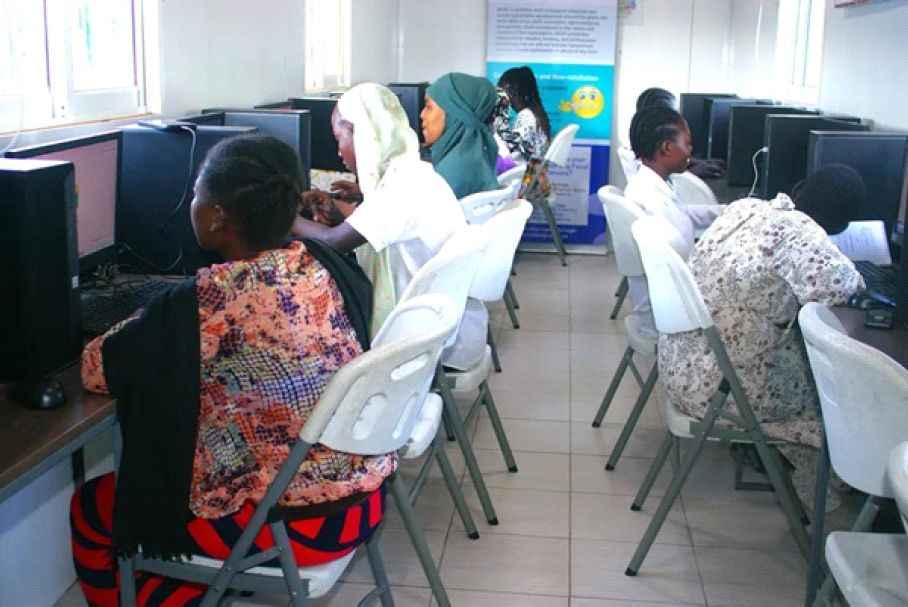Breaking Barriers with Digital Skills: LEAP’s Story in Kakuma


In the heart of Kakuma Refugee Camp, amidst the vast horizons of Turkana County, a story of transformation is unfolding, where resilience meets opportunity, and barriers give way to progress. Here, young women are rewriting their futures, and finding their voice and purpose through participating in digital skills training supported by the Learning through Education and Access to Skills for Employment (LEAP) project.
LEAP is a 5-year project implemented by World University Service of Canada (WUSC), with funding from Global Affairs Canada (GAC). The project takes a multifaceted approach to enhancing girls’ empowerment through improving girls’ educational pathways. As part of the project, WUSC partnered with Solidarity Initiative for Refugees (SIR), a community-based, refugee-led organization, deeply attuned to the community’s struggles and aspirations. Together, they enhanced the existing Digital Hub at the SIR Centre and expanded its capacity to provide the infrastructure and support needed to offer comprehensive digital skills training for participating young women.
For five years, this partnership has equipped more than 470 young women with digital tools to navigate the gig economy, paired with essential life skills to overcome daily life challenges. But the program’s impact goes far beyond technical training, it leaves a legacy of empowerment that will continue to reverberate long after the program ends in December 2024. Daima Associates, contracted by WUSC, played a crucial role in capturing and mobilizing the knowledge and learnings generated by the program.
A Holistic Approach to Empowerment: More than Just Digital Skills
At its heart, the LEAP Digital Skills Training program was designed to address more than just the technical challenges women face in Kakuma and the surrounding areas. While digital skills are critical, LEAP recognized that real empowerment comes from addressing the wider barriers these women face; barriers like limited access to education opportunities, restrictive gender norms, and logistical hurdles like distance and unreliable internet.
The program embraced a holistic approach, integrating the Good Start model, a course designed to strengthen personal agency through key life skills abilities that enable individuals to adapt and respond positively to life’s challenges. While tailored to the unique needs of refugee groups in East Africa, the curriculum incorporated training on financial literacy, navigating cultural dynamics, and building self-confidence. These psychosocial competencies complemented technical training on skills like transcription and graphic design while promoting independence, resilience, and the ability to thrive in diverse environments.
“It was not just about learning to work online. We were taught about money management, setting goals, and overcoming emotional barriers. It gave us a sense of purpose and confidence,” shared a graduate of the program during a focus group discussion.
Digital Hub: A Launchpad for Careers in the Digital Economy
The Digital Hub, often referred to as the SIR Centre by locals, quickly became more than just a place to learn; it became a stepping stone for young women to enter the digital workforce. Beyond imparting technical skills, the program’s real strength lay in the mentorship, peer support, and online job linkages that were integral to its design. Through ongoing guidance, participants were connected with mentors who provided participants with technical support, advice on navigating freelancing platforms, and crucial moral support, especially during challenging periods. The mentors not only helped with skill-building; they provided constructive feedback, motivation, and practical guidance.
But beyond the digital tools, it was the community that made all the difference. As the program grew, the SIR Centre began offering support not only to refugees but also to members of the host community. This inclusivity ensured that LEAP had a broader, more profound impact, helping to bridge gaps between the two communities. However, getting women from the host community involved wasn’t always easy.
Many faced significant logistical challenges, including long distances to the Hub. To ensure accessibility, LEAP offered transportation incentives, making sure that these women could attend training without worrying about travel costs.
Stories of Impact: Real Change, Real Lives
Ekaran, a young mother from the host community, was unsure at first how she would balance the demands of motherhood with training. The introduction of a crèche facility at the Hub gave her the peace of mind to attend classes without worrying about her child. “The crèche made it possible for me to attend classes without worrying about my child. Now, I’m earning online and supporting my family,” she shared.
Then there’s Fardos, a refugee with no prior experience in technology, who found her footing through LEAP’s phased approach. Starting with foundational ICT skills, she quickly advanced to become a key member of the Hub’s Business Process Outsourcing (BPO) unit, offering transcription services to international clients.
For others, like Fardos, the financial literacy training proved life-changing. “I learned how to save and budget. I can now support my family, but more importantly, I have the confidence to stand up for myself and make decisions that impact my future, ” she explained.
The ripple effect of these individual stories extends to their families and communities. With the newfound income from online work, many women have shifted household dynamics, with men beginning to share in domestic responsibilities. As one community leader put it, “When a woman brings in money, it changes the whole household. This program is helping to shift the mindset that men should be the only providers.”
Overcoming Challenges: Insights from Kakuma
While the program’s success stories are inspiring, the journey has not been without challenges. Cultural resistance emerged as a significant barrier early on, particularly within a context where gender roles are deeply entrenched. Many families questioned the value of digital skills training for young women, reflecting broader skepticism about breaking traditional norms.
To address this the program actively engaged male champions and local leaders through collaborative initiatives like the Engaging Men through Accountable Practice (EMAP) program. This approach involved structured, reflective sessions encouraging men to examine their roles in perpetuating or challenging harmful gender norms. Gradually, this strategy promoted greater community support. As one male champion shared “Once a girl gets a job and brings income, it even breaks that culture… What they bring is a benefit to the community. This has changed the notion that the man is supposed to provide, and the woman is to take care of the home”
However, resistance persisted in some areas. Deep-seated cultural norms, fear of change, and misconceptions about the program’s intentions fueled defensiveness among some men. As one EMAP representative from the DRC noted, “You see, if you share the feedback from the young women, the men feel like women went to set them up… so there was resistance.”
Another significant challenge encountered was that of limited infrastructure. Many participants lacked access to devices and reliable internet outside the Hub. For graduate participants, the lack of technology posed an even greater risk; without the tools to practice and develop their skills, their training would quickly become outdated.
Recognizing this, the program adopted. To ensure that no one’s skills would stagnate, the Digital Hub opened its doors to both current and former trainees, providing access to computers and reliable internet in scheduled shifts. The Digital Hub also transitioned to Starlink for more reliable internet access, allowing participants to stay connected and continue working on online platforms.
For young mothers, retention was another hurdle. Juggling childcare with training was a significant challenge for many. The introduction of the crèche facility and structured mentorship helped improve retention, offering the support women needed to stay in the program and complete their training.
A Blueprint for the Future: Lessons from LEAP’s Journey
As the LEAP Digital Skills Training Program approaches its final months, it’s clear that the journey hasn’t just been about imparting digital skills, it’s been a learning process in itself. For WUSC, the program’s conclusion isn’t just a moment to celebrate the successes, but also to reflect on the invaluable lessons that will shape future initiatives. While it’s easy to focus on the success stories that highlight the most remarkable transformations, we know all too well that this approach can oversimplify the true impact of a program. These stories, while important, may risk creating an overly rosy picture that downplays the very real challenges that come with implementing digital livelihoods programs.
The truth is, the LEAP didn’t achieve success in a straight line. It was shaped by the setbacks and the adaptations that emerged along the way. For us, the key takeaway is this: if we want future programs to be truly transformative, we must be honest about what we’ve achieved, and what we still need to work on. The path to lasting, sustainable change is built on continuous improvement, on adapting to the needs of participants, and on staying committed to the larger vision, even when it’s not always easy.
Building on these lessons, flexibility has emerged as a cornerstone of success. We’ve learned that programs must meet participants where they are, offering phased learning approaches that start with the basics and gradually build to more complex concepts. But beyond the technical training, support structures are just as critical. The LEAP program has shown that wraparound services, whether childcare, mentorship, or emotional support, are key to helping young women thrive. It’s these support systems that create an environment where participants are not only able to gain skills but also feel confident and capable of putting them to use in the real world. Perhaps the most important lesson has been the need for continuous community engagement.
Programs cannot succeed in isolation. They must be embedded within the communities they serve, with buy-in from local leaders, families, and male allies. This ensures that programs are not only culturally sensitive but also widely accepted and supported. Finally, to achieve sustainability, programs must go beyond donor-funded cycles and create long-term solutions. This is where revenue-generating models come in, whether through partnerships with local businesses or income-generating initiatives like Business Process Outsourcing (BPO) units. These models ensure that the program’s impact doesn’t fade once the funding runs out. By embedding these strategies into the program’s DNA, the benefits will continue to be felt long after the last session ends.
